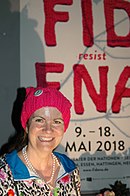Puppet Theater of Nations
The Puppet Theater of Nations (FIDENA) is one of the oldest festivals for puppet and object theater in Europe. The festival in the Ruhr area presents international productions at different venues for a week. The organizer is the German Forum for Puppet Theater and Puppetry
history
In 1958, the Bochum publisher Fritz Wortelmann founded an international festival in his hometown, initially under the name “Master of Puppetry”, which was renamed “Puppet Theater of Nations” in 1972. Wortelmann, who was involved in the founding of the international puppet theater organization UNIMA ( Union Internationale de la Marionnette ) in 1960, in his publication "Perlicko-Perlacko", points out the extraordinary importance of artist friendships in times of political demarcation and hostility. The first puppeteer masters invited to Bochum were the young Stuttgart puppeteer Albrecht Roser , the French Jacques Chesnais, the Dresden hand puppeteer Carl Schröder and the director of the Moscow State Puppet Theater, Sergej Obraszow .
After Fritz Wortelmann's death, the theater scholar Jürgen Klünder took over the management of the German Institute for Puppetry (DIP) and FIDENA. He first turned his attention to the potential of puppet theater as a folk art. He was interested in alternatives to established forms of theater, including those with political aspirations, such as the " Bread and Puppet Theater ". He later revised this view and opened the festival further to various experimental forms. He brought the Americans Eric Bass and Roman Paska and Neville Tranter (Stuffed Puppet Theater) to Bochum in 1986 . In 1989 he propagated the "end of modesty" and invited mainly large productions from established ensemble puppet theaters from Eastern Europe, China and the GDR.
After the closure of the German Institute for Puppetry in 1990, enforced by the city and the state, the “German Forum for Puppet Theater and Puppetry (dfp)” was created in 1991 by the city of Bochum and key associations and educational institutions for puppet theater. The East Berlin theater scholar and critic Silvia Brendenal, as director, opened up a view of object theater from France and Italy ( Gyula Molnar , Roland Shön ). Bundled thematically by a motto, the range of performances ranged from solo hand puppet production or narrative theater with objects for children to large ensemble productions with masks, puppets and drama to kinetic installations. The Kammertheater Neubrandenburg or the Materialtheater Stuttgart from Germany stood for this; from Japan Hoichi Okamoto with his work oscillating between butoh , bunraku and mask theater; from Denmark the Danish Paraplyteatret with poetic worlds of things for children and the Handspring Puppet Company from South Africa with the visual artist William Kentridge .

Even after the change of management in 1997, FIDENA retained its profile as a puppet theater festival with a focus on innovative forms. The new artistic director, Annette Dabs , who was trained in opera and cultural management , continued the line that had begun. The invitation of the Australian artist Stelarc with his performance “Exosceleton” to kick off FIDENA 1999 set an example for the search for interfaces between the visual and performing arts. This includes productions at the very edge of what is meant by puppet theater. Works by the Canadian Robert Lepage , the Ukrainian director Andrij Zholdak and the French choreographer Gisèle Vienne have since been represented as well as current versions of historical-anarchic puppet theater . FIDENA is developing into a producing festival, with many premieres being co-produced or commissioned in Bochum.
Individual evidence
- ↑ "Perlicko-Perlacko, Fachblätter für Puppenspiel", Volume III, 1960
- ↑ Jürgen Klünder: End of modesty. in: Figurentheater, issue 2/1988
literature
- Anke Meyer: 50 Years of Puppet Theater of Nations - A Review , published by the German Forum for Puppet Theater, Bochum 2008
- Andrea Schmidt: Between Tradition and Experiment , Ed. German Forum for Puppet Theater and Puppetry, Frankfurt 2002, ISBN 978-3-935011-23-5
- German Institute for Puppetry: The Puppeteer: Magazine for the entire puppetry industry , 1st to 5th year, Bochum 1930–1950
- German Institute for Puppetry: Puppet Theater. Quarterly magazine , volumes 1 - 22, Bochum 1963–1990
Web links
- Internet presence of the German Forum for Puppet Theater and Puppetry
- Fidena 2013 , film Bochumschau "bodies in urban spaces"
- Fidena 2012 , film Bochumschau "He dances with the excavator"
- Fidena 2012 , film Bochumschau "Weißes Blatt / Page Blanche"
- Fidena 2010 , film contribution Bochumschau